Chengxi Deng
MOPSA: Mixture of Prompt-Experts Based Speaker Adaptation for Elderly Speech Recognition
May 30, 2025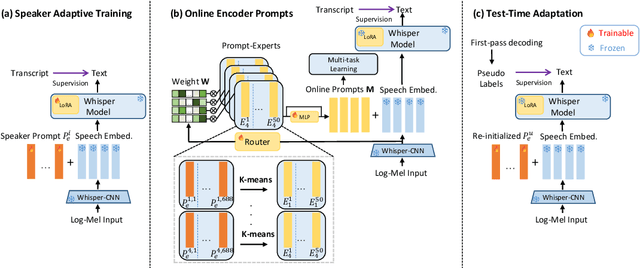

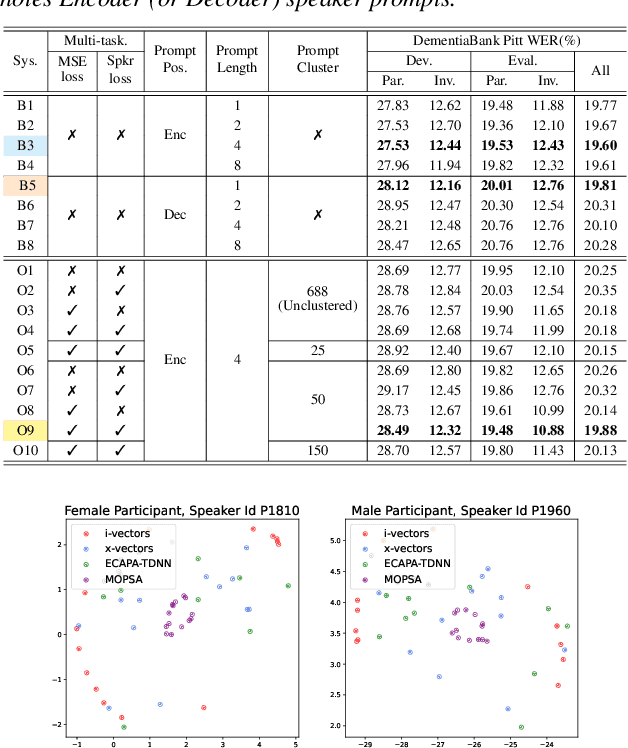
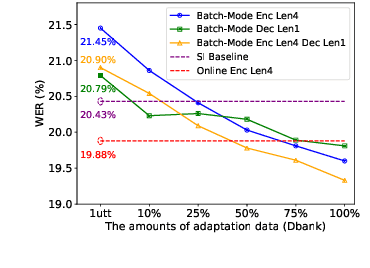
Abstract:This paper proposes a novel Mixture of Prompt-Experts based Speaker Adaptation approach (MOPSA) for elderly speech recognition. It allows zero-shot, real-time adaptation to unseen speakers, and leverages domain knowledge tailored to elderly speakers. Top-K most distinctive speaker prompt clusters derived using K-means serve as experts. A router network is trained to dynamically combine clustered prompt-experts. Acoustic and language level variability among elderly speakers are modelled using separate encoder and decoder prompts for Whisper. Experiments on the English DementiaBank Pitt and Cantonese JCCOCC MoCA elderly speech datasets suggest that online MOPSA adaptation outperforms the speaker-independent (SI) model by statistically significant word error rate (WER) or character error rate (CER) reductions of 0.86% and 1.47% absolute (4.21% and 5.40% relative). Real-time factor (RTF) speed-up ratios of up to 16.12 times are obtained over offline batch-mode adaptation.
Towards LLM-Empowered Fine-Grained Speech Descriptors for Explainable Emotion Recognition
May 29, 2025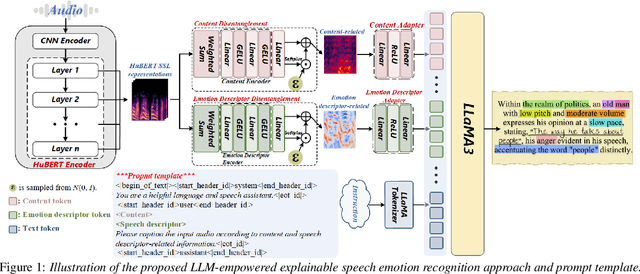
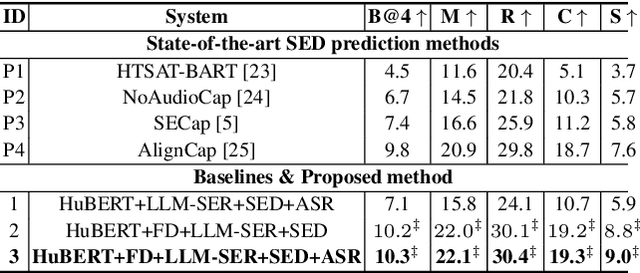
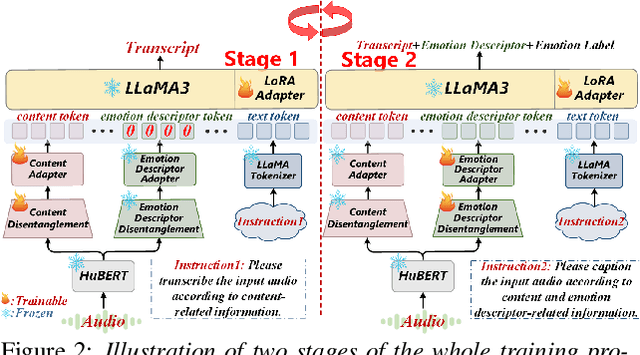
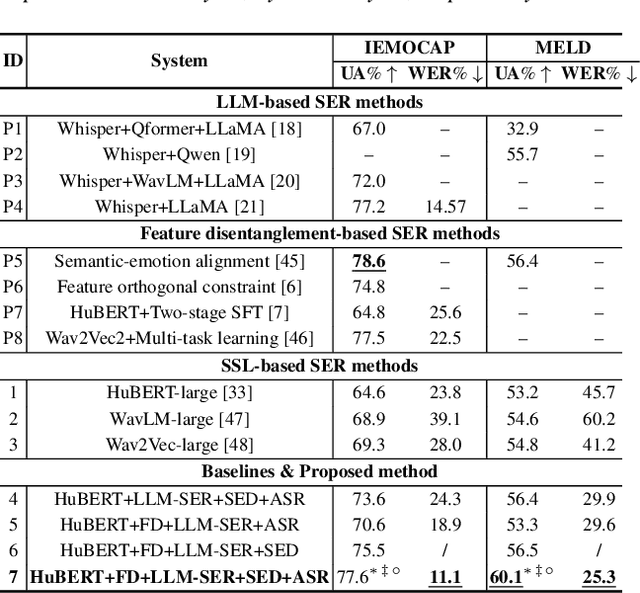
Abstract:This paper presents a novel end-to-end LLM-empowered explainable speech emotion recognition (SER) approach. Fine-grained speech emotion descriptor (SED) features, e.g., pitch, tone and emphasis, are disentangled from HuBERT SSL representations via alternating LLM fine-tuning to joint SER-SED prediction and ASR tasks. VAE compressed HuBERT features derived via Information Bottleneck (IB) are used to adjust feature granularity. Experiments on the IEMOCAP and MELD benchmarks demonstrate that our approach consistently outperforms comparable LLaMA-based SER baselines, including those using either (a) alternating multi-task fine-tuning alone or (b) feature disentanglement only. Statistically significant increase of SER unweighted accuracy by up to 4.0% and 3.7% absolute (5.4% and 6.6% relative) are obtained. More importantly, emotion descriptors offer further explainability for SER.
On-the-fly Routing for Zero-shot MoE Speaker Adaptation of Speech Foundation Models for Dysarthric Speech Recognition
May 28, 2025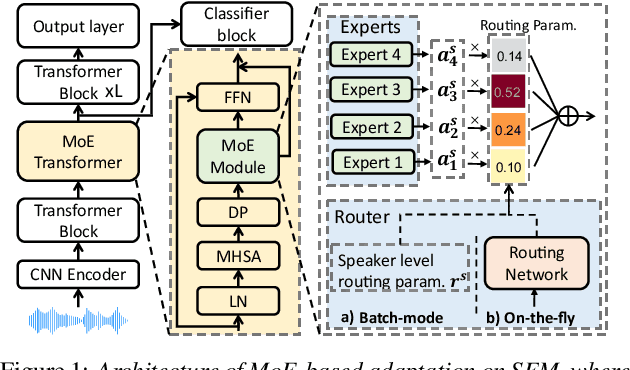
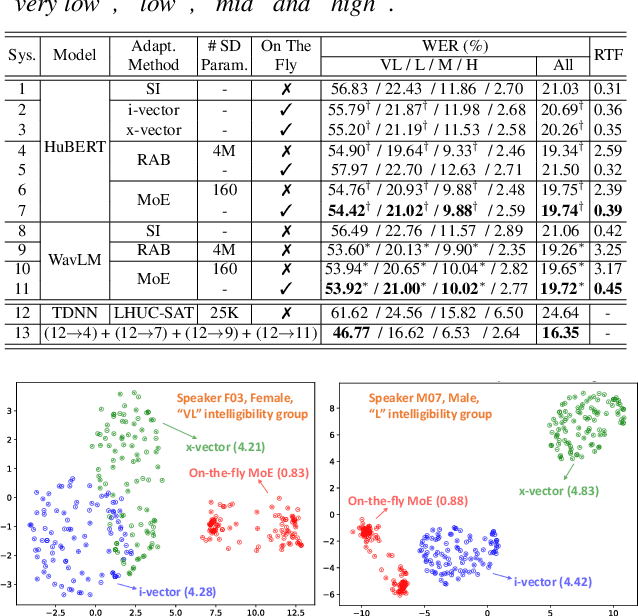


Abstract:This paper proposes a novel MoE-based speaker adaptation framework for foundation models based dysarthric speech recognition. This approach enables zero-shot adaptation and real-time processing while incorporating domain knowledge. Speech impairment severity and gender conditioned adapter experts are dynamically combined using on-the-fly predicted speaker-dependent routing parameters. KL-divergence is used to further enforce diversity among experts and their generalization to unseen speakers. Experimental results on the UASpeech corpus suggest that on-the-fly MoE-based adaptation produces statistically significant WER reductions of up to 1.34% absolute (6.36% relative) over the unadapted baseline HuBERT/WavLM models. Consistent WER reductions of up to 2.55% absolute (11.44% relative) and RTF speedups of up to 7 times are obtained over batch-mode adaptation across varying speaker-level data quantities. The lowest published WER of 16.35% (46.77% on very low intelligibility) is obtained.
Effective and Efficient One-pass Compression of Speech Foundation Models Using Sparsity-aware Self-pinching Gates
May 28, 2025



Abstract:This paper presents a novel approach for speech foundation models compression that tightly integrates model pruning and parameter update into a single stage. Highly compact layer-level tied self-pinching gates each containing only a single learnable threshold are jointly trained with uncompressed models and used in fine-grained neuron level pruning. Experiments conducted on the LibriSpeech-100hr corpus suggest that our approach reduces the number of parameters of wav2vec2.0-base and HuBERT-large models by 65% and 60% respectively, while incurring no statistically significant word error rate (WER) increase on the test-clean dataset. Compared to previously published methods on the same task, our approach not only achieves the lowest WER of 7.05% on the test-clean dataset under a comparable model compression ratio of 4.26x, but also operates with at least 25% less model compression time.
 Add to Chrome
Add to Chrome Add to Firefox
Add to Firefox Add to Edge
Add to Edge